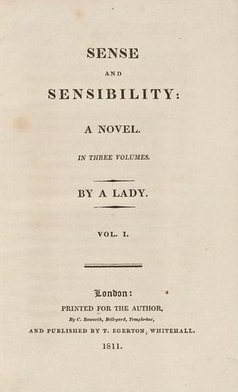
In the article ‘Blogging as Social Action: A Genre Analysis of the Weblog’, Carolyn Miller and Dawn Shepherd explored the issues of online identities and fictionalization on the Internet. I began to wonder: do writers who write anonymously or under a pseudonym create a virtual identity, and does that affect how their audiences approach their work? Would their work be seen as untrustworthy?
Anonymity today is widely regarded as something suspicious and skeptical. In a fairly recent TED talk delivered by Brooke Magnanti, who wrote an blog anonymously for 6 years before she revealed her identity, talked about anonymous writers who needed anonymity and the reason behind it. One example that she used to illustrate her point is Jane Austen. Jane Austen published her book ‘Sense and Sensibility’ under the pseudonym ‘By a lady’, partly because of personal modesty, but also it was considered unladylike to write novels at her time. The book turned out to be a great success, and all 750 printed copies were sold out by July 1813. Many of her books are being translated in many languages and continuing to be adapted into TV shows and movies today. This shows that for many readers, content is more important than the identity of the writer. People at the time who read Jane Austen’s books didn’t just love them because they were written by Jane Austen.
Another successful anonymous blog is Waiter Rant, which is written by a Manhattan waiter. He shares anecdotes about his customers and conversations he had throughout the day in the restaurant where he works. He uses first personal narrative, includes his own observations and reflections in his writing (Morris), and offers insightful comments. Most readers are attracted to the content of his blog as well as his writing style, which is genuine, personal (as well as very witty), and that it further enhances his personality. Miller and Shepherd referred to The Weblog Review, which stated that most bloggers think that content is the most important feature of a blog as it ‘represents their freedom of selection and presentation’ (Miller and Shepherd). Most of the time, the value of anonymity for writer is enormous, but for the readers, it is less important to know who is writing. (Magnanti).
Work cited:
Miller, Carolyn, and Dawn Shephred. ” Blogging as Social Action: A Genre Analysis of the Weblog.” Into the Blogosphere: Rhetoric, Community, and Culture of Weblogs. Ed. Laura J. Gurak, Smiljana, Antonijevic, Laurie Johnson, Clancy Ratliff and Jessica Reyman. June 2004.Web. 21 Sept. 2014. <http://blog.lib.umn.edu/blogosphere/blogging_as_social_action_a_genre_analysis_of_the_weblog.html>.
“In Defence of Anonymity: Brooke Magnanti at TEDxEastEnd.” YouTube. YouTube, n.d. Web. 21 Sept. 2014. https://www.youtube.com/watch?v=1ZnXPVyWP8w
O’Connor, Kate. “The Anonymous Jane Austen.” Great Writers Inspire: Learning from the Past. N.p., n.d. Web. 21 Sept. 2014. <http://writersinspire.org/content/anonymous-jane-austen>.
Morris, Sofia. “An Anonymous Blogger Tells All.” Home » Arthur L. Carter Journalism Institute at New York University. N.p., 2005. Web. 21 Sept. 2014. http://journalism.nyu.edu/publishing/archives/notablog/story/anonymous/
Digital image. N.p., n.d. Web. <http://www.historytoday.com/sites/default/files/sense.jpg>